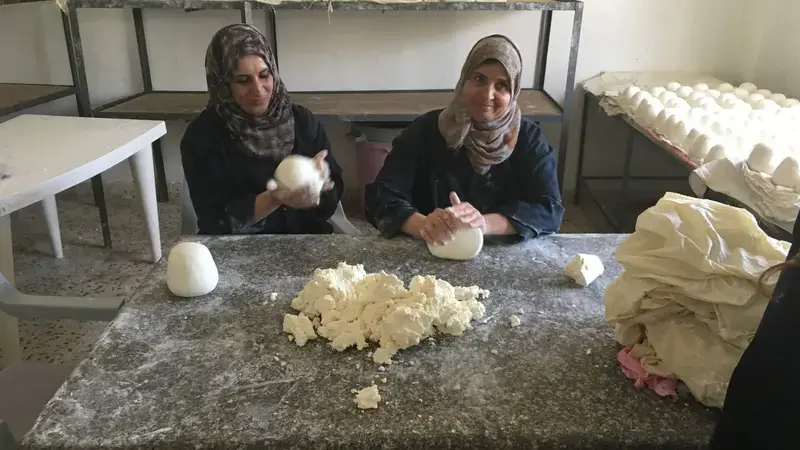Jameed production innovations improve women's income

- Muhi El-Dine Hilali - Dairy Technologist
ICARDA scientists developed improved Jameed processing methods for use in small-scale dairies, to reduce cost, time, and resource use for increased incomes for rural women.
Twenty-four percent of milk produced in Jordan comes from sheep, supplying with a high and stable demand for sheep milk products. Jameed, a ball of hardened skimmed yogurt used in the traditional dish 'Mansaf', is a popular and high-net income sheep-milk-derived product. It contributes to 20 percent of small ruminant farmers’ income and is a crucial contributor to household livelihoods.
The traditional way to make Jameed is to separate the butter from the yogurt through a 500 Watt churning machine before molding the resulting yogurt into balls that are left to dry. But after analyzing 90 Jameed samples collected across the country, ICARDA scientists discovered that the traditional churning method is inefficient, leaving a high-fat content in the yogurt, resulting in short shelf-life products that quickly become rancid.
To remedy this, ICARDA scientists developed an improved method for Jameed processing using a 200 Watt fat separator machine to produce skimmed milk with lower fat content. With no churning involved, the skimmed milk will be turned into yogurt, concentrated, and then salted and shaped into balls, and dried. The separated fat, instead of being part of the final Jameed product, is used to make sellable ghee, used in other dishes. The new ICARDA approach saves time, labor, water, and electricity and improves income mainly for women who do most of the processing work in dairies.
-------------------------------------------------------------------------------------
IMPACT
Jameed produced at a small-scale processing unit using the ICARDA approach had 72 percent less fat and 11 percent higher protein content compared to conventional Jameed processing, while producing 29 percent more ghee.
-
The color of the jammed balls was four percent lighter, making them more attractive to consumers.
-
Energy and water consumption dropped by 60 percent, which is very beneficial in a country that faces shortages in both.
-
For small-scale producers, the ICARDA approach increased net income by 20 percent, reduced working hours, and made the process less physically demanding, which is an obvious benefit for the women working in this field.

Further Reading:
Masnat El-Hiary, Yigezu Yigezu, Barbara Rischkowsky, Muhi El-Dine Hilali, Bassam Shdifat. (1/12/2013). Enhancing the Dairy Processing Skills and Market Access of Rural Women in Jordan. Beirut, Lebanon: International Center for Agricultural Research in the Dry Areas (ICARDA). https://repo.mel.cgiar.org/handle/20.500.11766/7873
Jumana Hijazi, Liqa El Herbeid, Mourad Rekik, Muhi El-Dine Hilali. (22/4/2018). Enhancing Jameed quality by improved processing methods for small scale dairy sheep farms in Jordan. https://repo.mel.cgiar.org/handle/20.500.11766/10071
Muhi El-Dine Hilali, Hutheifa Ababneh, Mourad Rekik, Barbara Rischkowsky. (27/9/2018). Qualitative characteristics of traditional Jordanian Jameed and a way to improve quality and reduce health risks. Beirut, Lebanon: International Center for Agricultural Research in the Dry Areas (ICARDA). https://repo.mel.cgiar.org/handle/20.500.11766/9436
